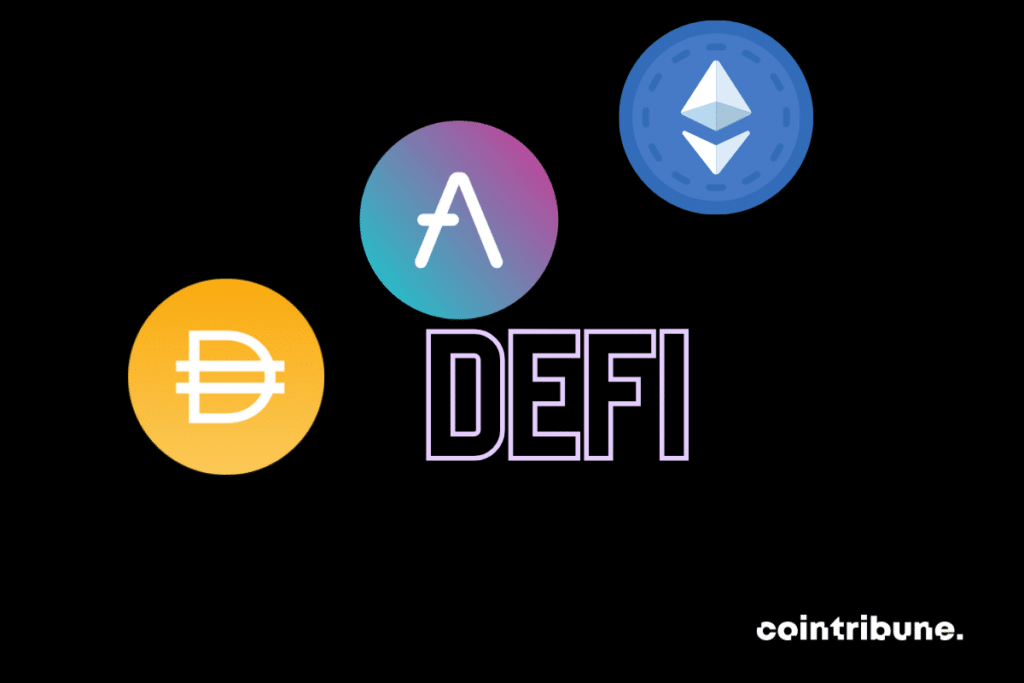DeFi Strategies: Optimize Your Gains in 2024
In the rapidly evolving financial world, decentralized finance (DeFi) presents itself as an innovative and burgeoning sector. With its promises of high returns and new forms of investment, DeFi is attracting a growing number of investors. However, navigating this complex and constantly evolving space can be intimidating, especially when it comes to optimizing gains while minimizing risks. This article aims to demystify investment strategies in DeFi, emphasizing best practices to boost gains. We will explore key approaches such as in-depth research, risk management, and security, essential practices for succeeding in the DeFi universe.

DeFi and its fundamentals: a brief conceptual explanation
Decentralized finance is revolutionizing the financial world by offering an alternative to traditional banking systems. Based on blockchain technology, DeFi enables direct financial transactions between parties without intermediaries. Smart contracts automate these transactions, ensuring security and transparency. Decentralized finance encompasses various financial services, such as lending, borrowing, and exchanging cryptocurrencies, thereby opening up a new field of possibilities for investors.
What investment strategies to optimize your gains in DeFi?
Decentralized finance offers a fertile ground for strategic investors seeking to optimize their gains. Navigating this space requires a deep understanding of the various investment strategies available. These strategies, while promising, come with varying levels of risk and potential return. We will explore three key strategies to maximize gains in DeFi, each requiring a specific approach and understanding.
Asset Diversification
Diversification is a fundamental strategy in DeFi, as in any investment. It involves spreading investments across different DeFi assets or protocols to reduce risks. In DeFi, this can mean investing in a variety of tokens, participating in different liquidity pools, or engaging in multiple forms of yield farming. This strategic approach helps mitigate potential losses if a specific asset or protocol depreciates or fails. However, diversification requires thorough research and an understanding of the various assets and protocols available in the market. It is important to understand the underlying mechanisms of each investment, including risks, expected returns, and long-term stability.
Yield Farming and Staking
Yield farming is a popular technique in the decentralized finance space, allowing investors to earn rewards by making their cryptocurrencies available to DeFi protocols. This strategy often involves providing liquidity to liquidity pools or participating in lending programs. Staking, a form of yield farming, involves locking cryptocurrencies to support the operation of a blockchain network in exchange for rewards. These methods can offer attractive returns, but they come with risks, including price volatility and the possibility of loss in case of protocol failure. It is important to conduct a thorough analysis of the protocols and potential rewards before engaging in yield farming or staking. Investors should also be aware of the tax and regulatory implications of these activities.

Best Practices to Adopt to Boost Your Gains in DeFi
In the dynamic world of decentralized finance, it is important to adopt optimal practices to maximize gains while minimizing risks. These practices are not limited to making smart investment choices. They also encompass strategic resource management, an in-depth understanding of the market, and constant vigilance in terms of security. Let’s take a closer look at these three key practices that can help investors effectively navigate the decentralized finance landscape.
In-depth Research and Continuous Market Analysis
Research and analysis are fundamental pillars for succeeding in DeFi. This involves thoroughly studying different DeFi protocols, understanding market mechanisms, and constantly monitoring emerging trends. Investors must assess protocols based on their performance, security, and growth potential. Moreover, continuous market analysis allows for quickly identifying investment opportunities and responding to market changes. This includes monitoring economic indicators, understanding market cycles, and adapting strategies according to changing conditions. Such a strategic and informed approach is necessary to make informed investment decisions and remain competitive in the decentralized finance space.
Effective Risk Management
Risk management is a crucial aspect of any DeFi investment. It involves evaluating and minimizing potential risks associated with each investment. Investors must be aware of different types of risks, such as market risk, liquidity risk, and counterparty risk. Implementing strategies such as diversifying investments, using stop-loss orders, and limiting exposure to highly volatile assets is necessary to manage these risks. Additionally, it is important to stay informed about regulatory developments and the tax implications of investments in decentralized finance. Effective risk management helps protect invested capital and optimize long-term returns.
Security and Regulatory Compliance
Security is a major concern in the DeFi space. Investors must adopt robust security practices to protect their digital assets. This includes using hardware wallets, setting up backup procedures, and being vigilant against scams and hacks. Furthermore, regulatory compliance should not be overlooked. Investors must stay informed about the laws and regulations in their jurisdiction and ensure their investment activities are compliant. This may involve consulting legal and tax advisors specialized in cryptocurrencies. By adopting rigorous security measures and adhering to regulations, investors can not only protect their assets but also avoid potential legal complications.
Conclusion
In conclusion, investing in DeFi requires a thoughtful strategy and careful management. The keys to success lie in rigorous market analysis, effective risk management, and a strong focus on security. By adopting these practices, investors can not only increase their potential gains but also minimize the inherent risks in this dynamic space. Decentralized finance, with its challenges and opportunities, requires a balanced and informed approach, essential for successfully navigating this constantly evolving domain.
Maximize your Cointribune experience with our "Read to Earn" program! For every article you read, earn points and access exclusive rewards. Sign up now and start earning benefits.
The Cointribune editorial team unites its voices to address topics related to cryptocurrencies, investment, the metaverse, and NFTs, while striving to answer your questions as best as possible.
The views, thoughts, and opinions expressed in this article belong solely to the author, and should not be taken as investment advice. Do your own research before taking any investment decisions.